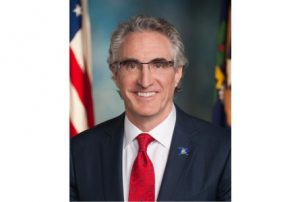 BISMARCK, N.D. (AP) — Calling for a leaner and more efficient state government, North Dakota Gov. Doug Burgum told agency directors Wednesday to identify substantial spending cuts when they begin preparing their plans for the next two-year budget.The first-term Republican governor, who ran on a message of controlling “runaway spending,” told agency heads to “identify those things we can do without, as opposed to starting with justifying everything we already have.”Burgum said agencies must slash budgets 5 percent or 10 percent, with the larger ones responsible for the bigger cuts. He called for agencies to identify an additional 3 percent reduction as a cushion against commodity price swings.Additionally, Burgum called for a 5 percent reduction in agency staffing, the savings of which could be applied to overall agency cuts. Burgum’s directive excludes cuts to K-12 education and Medicaid programs.”More than ever before, it’s essential that agencies conduct a rigorous self-examination,” Burgum said during his half-hour address at the state Capitol.
BISMARCK, N.D. (AP) — Calling for a leaner and more efficient state government, North Dakota Gov. Doug Burgum told agency directors Wednesday to identify substantial spending cuts when they begin preparing their plans for the next two-year budget.The first-term Republican governor, who ran on a message of controlling “runaway spending,” told agency heads to “identify those things we can do without, as opposed to starting with justifying everything we already have.”Burgum said agencies must slash budgets 5 percent or 10 percent, with the larger ones responsible for the bigger cuts. He called for agencies to identify an additional 3 percent reduction as a cushion against commodity price swings.Additionally, Burgum called for a 5 percent reduction in agency staffing, the savings of which could be applied to overall agency cuts. Burgum’s directive excludes cuts to K-12 education and Medicaid programs.”More than ever before, it’s essential that agencies conduct a rigorous self-examination,” Burgum said during his half-hour address at the state Capitol.
The governor will use the blueprints to draft his own spending recommendations for the Legislature when lawmakers meet in January.
The state’s current two-year budget including federal aid is $13.6 billion. It includes $4.3 billion in state general fund spending, or $1.7 billion less than the 2015 budget that had more than doubled since 2009 with the rise of oil activity in the state.
The general fund portion of the budget is spent on an assortment of programs, including education and human services. It is funded largely by state taxes on income, sales and energy.
Burgum took office amid a sharp downturn in tax revenues due to prolonged slumps in oil and agriculture prices. The state’s budget was balanced last year through layoffs, and raids on state savings.
Burgum said his budget instructions did not indicate a belief that North Dakota’s economic growth is slowing. He said North Dakota has more than 14,000 unfilled jobs and “oil activity is more robust than anticipated.” But while oil activity has rebounded to near record levels in recent months, he warned against counting on the increased revenue to balance budgets.
“As we know from recent experience, it is very risky to make spending decisions based on market forces beyond our control,” Burgum said.












Comments are closed
Sorry, but you cannot leave a comment for this post.